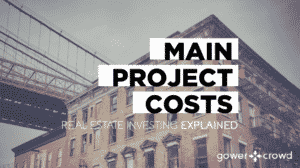FREE TRAINING
What is Real Estate Crowdfunding?
Learn how to build wealth and earn passive income in real estate while someone else does all the work.
Portfolio Diversification Benefits of Real Estate
By Adam Gower Ph.D.
A New Approach for Your Portolio
Registered investment advisors, or RIAs, have long scoured the market for the top performing securities to invest in on behalf of their high-net-worth clients. Historically, RIAs would invest in some combination of stocks, bonds, and cash as a means of balancing a client’s portfolio. Investing in commercial real estate was never really an option, per the regulations established by the Securities and Exchange Commission (SEC).
That all changed when the SEC revised its regulations back in 2012.
Per the new SEC regulations, real estate developers can now sell securities in real estate deals to the general public. Yet RIAs are often unaware that this option exists.
In short, it works like this: just as RIAs would purchase stock in Apple or Facebook, they can now buy shares in commercial real estate deals. The entire investment is governed by SEC regulations similar to how they would be if it was an investment in a traditional security.
That said, there are big differences to buying real estate securities vs. traditional securities.
When an RIA invests in private real estate, they’re investing in a tangible product.
Unlike buying stocks and bonds, those who invest in commercial real estate are investing in a tangible asset class – it’s a product that you can touch and feel. Some investors take comfort in the simplicity of buying into commercial real estate, particularly multifamily housing. That’s because an asset class like multifamily housing is something the layperson can relate to.
Everyone needs somewhere to live. Build an apartment complex, rent it out, collect the cash flow and return dividends to investors. Yes, this is grossly oversimplified—but the point is most people have been in commercial properties and understand, generally, how they operate compared to how the stock market operates.
Get access to our FREE weekly newsletter exclusively covering the latest updates from the real estate crowdfunding world
Unlike stocks and bonds, commercial real estate is relatively illiquid
One of the benefits to traditional securities is that they are liquid. RIAs can purchase 10,000 shares of Facebook one minute and sell them the very next, if they so choose.
Investing in private real estate is much different.
Real estate is an illiquid asset class. Just consider what it takes to buy or sell a home. This can’t be done with the click of a button. There’s usually a listing process, open house or two, contract negotiations, financing that needs to be lined up, and a multi-week closing process with the bank and various attorneys.
Commercial real estate is even more complex. Deals have longer lead times and there are higher barriers to entry and exit. This makes commercial real estate even more illiquid than its residential counterpart. RIAs who invest in private real estate must understand this liquidity/illiquidity tradeoff.
REITs provide a middle-ground for those looking to maintain liquidity—but come at a cost
REITs, or real estate investment trusts, are entities that finance, develop, or own income-producing commercial real estate. Most REITs are publicly-traded so shares can be bought and sold just like other stocks on the stock market. Buying a REIT is often a good compromise for RIAs looking to maintain liquidity while also diversifying their clients’ portfolios.
Yet REITs come with what’s known as a “liquidity premium”. REITs allow investors to trade what is inherently illiquid (commercial real estate) in a liquid way, but in exchange, investors pay more for the underlying asset than if they were to invest directly in private real estate.
Returns are often higher when investing in private real estate
Whereas traditional securities like stocks, bonds and REITs carry a liquidity premium, the inverse is true when investing in private real estate.
Instead, accredited investors pay market value – sometimes even below market value – when investing in private real estate. This is because they’re investing alongside commercial real estate developers who expect to add value to the project, whether through new construction or major renovation.
The commercial real estate developer, who may or may not have equity in the deal (and/or are collecting a developer’s fee) tend to fall at the bottom of the equity waterfall. In order for them to be paid, they have to reach certain benchmarks and achieve project completion. This motivates developers to move projects along expeditiously with the goal of achieving the highest returns possible.
This set up provides enhanced returns for investors. It’s not uncommon for accredited investors to achieve an 8% or more preferred return on a private real estate deal, while going on to double or triple their money when the developer ultimately sells the real estate.
In short, while commercial real estate is an illiquid asset class, it’s also more lucrative for those who invest. This is known as the “illiquidity premium” that’s often associated with investing in private real estate.
Investing in private real estate has become as easy as investing in stocks or bonds, thanks to the proliferation of real estate crowdfunding platforms
To be sure, investing in private real estate is not a new phenomenon. Savvy investors have always looked to real estate as an alternative investment, and one that can help balance their overall portfolios. However, the SEC regulations around investing in private real estate once required investors to have a personal relationship with the developer. This is how commercial real estate investing became referred to as “country club” money.
When the SEC laws changed in 2012, it opened the door to crowdfunding real estate deals. There are some prominent online platforms, such as RealCrowd and CrowdStreet, that allow accredited investors to buy into a real estate deal for as little as $10,000 and in some cases even less. There are hundreds of developers crowdfunding investment in their deals on an as-needed basis as opportunities come through their pipeline.
For more information and to gain access to:
- Guided tour of 8 real estate crowdfunding websites
- FREE: Complete list of every real estate syndication website
- FREE: 10 things to look for in real estate contracts
- Access to advanced real estate investment training
Private real estate investing allows RIAs to diversify their clients’ portfolios
Commercial real estate investment has soared in popularity among individual investors for several reasons. For one, private real estate behaves differently than stocks and bonds. Its illiquid nature makes it harder to buy and sell, and therefore, is less susceptible to market upheaval (at least in the short term). Two, investing in crowdfunded real estate opens up access to an asset class that may be difficult for people to obtain on their own.
But perhaps most importantly, buying commercial real estate has proven a great strategy for diversifying one’s investment portfolio. Private real estate helps to balance a portfolio in a way that could not similarly be achieved if only investing in stocks or bonds. This combination of liquid and illiquid asset classes makes a lot of sense from a portfolio allocation perspective and has proven successful over time.
Look no further than the Yale Endowment as evidence. According to the Congressional Research Service, the Ivy League endowment has consistently reported higher overall returns than its peers, including a 12.3% return for FY18. The “Yale Model” became famous more than 30 years ago for an approach it maintains today: invest heavily in alternative asset classes, including illiquid assets like commercial real estate. Three decades of outperformance allows the approach to speak for itself.
The Final Word: Balance is Key
As all RIAs know, balancing a client’s investment portfolio is highly dependent upon several factors, including their time horizon and risk profile. Accordingly, an RIA will want to allocate investments in some combination of liquid and illiquid assets, traditional and alternative just the same. Yet regardless of an individual investor’s profile, the same holds true across the board: at the end of the day, finding the appropriate balance is key.
Newbie
If you want to build your wealth and earn passive income from real estate investing and are looking at deals on marketplace platforms or through developers online, then I recommend you start by the 8 Key Financial terms so you can understand every deal you look at.
The 8 Financial Keys are not only a great way to get started, they are also essential to understanding how you’ll make money in any real estate deal.
You’ll learn the most important financial concepts you need to know in real estate investing that apply to every type of real estate no matter the asset class (office, industrial, residential, hospitality, retail).
Intermediate Investor
If you’ve got some online real estate investments under your belt already and are beginning to receive passive income checks each month, or have been paid off with profit – or (hopefully not) are finding that some deals are not quite panning out the way you expected, then check out this page for a wealth of free resources.
Here I cover everything from beginner all the way to very advanced real estate concepts.
You’ll find podcasts with developers, researchers, professors and other industry experts, detailed articles, and lots of videos, both short and long that are all easily searchable and totally free.
Advanced Investors
I am not shy about being straightforward about real estate investing; it is exciting, lucrative, and can help you build wealth and income as part of your investment portfolio, but it is not without its risks.
As an advanced investor you know this already, so I’ve put together a webinar for you that guides you through one of the most important components of real estate investing: Real Estate Contracts – reading between the lines.
This is advanced learning and based off conversations I had with three of the top real estate attorneys in the country, combined with my own personal experience. Access it here; it could be the most important webcast you watch all year.





